Edelman Trust Barometer: Building trust in Latin America and beyond
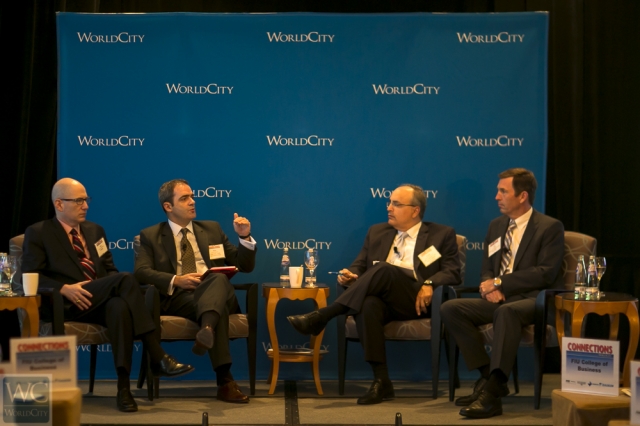
Latin Americans trust business far more than they trust government.
For news, they increasingly trust search engines like Google and their own selection from that search – more so than they trust traditional media.
Those were two insights from the Latin American portion of the 2014 Edelman Trust Barometer study presented March 25 at WorldCity’s Global Connections and discussed by a panel of top executives.
Across Latin America and worldwide, the 14th annual study found trust in government at its lowest level since the survey began in 2001.
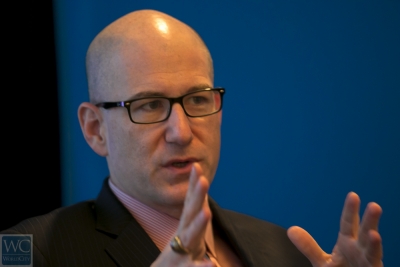
Alan VanderMolen, vice chairman of DJE Holdings overseeing Edelman’s eight business practices and the trust study. Photos by Carlos Miller
The public now looks to business to play a larger role to boost the economy, help society progress and safeguard the environment, said Alan VanderMolen, vice chairman of DJE Holdings overseeing Edelman’s eight business practices and the trust study.
Yet to keep and build trust, business can’t communicate in the same “top-down” way it long did.
“We’re seeing broadly a democratization of media,” said VanderMolen. Companies now need to communicate more “horizontally:” optimizing their rankings on search engines, beefing up their own websites with information on social issues and conversing on social media like Twitter and Facebook.
“That [top-down] model is out the window,” VanderMolen told an audience of nearly 100 executives. Business must “ get comfortable about the whole discussion of the environment around your brands.”
The latest Trust study involved online surveys of some 33,000 people in 27 nations, including 27,000 from the general public and 6,000 from “informed public” ages 25-64. The “informed” are those in the top 25 percent in income, college-educated, read or watch varied media and follow policy issues.
The research sees trust a leading indicator: “an expression of how stakeholders believe you are going to behave in the future.” That’s opposed to reputation, or perceptions based on “how you acted in the past,” he said.
Will low trust in government hurt business?
Ratings on trust appear tightly linked to economic conditions. For example, the survey shows greater trust in government in China, where the economy is strong, than in Spain, where it is weak, said Juan Iramain, managing director of corporate communications and public affairs for Citi Latin America.
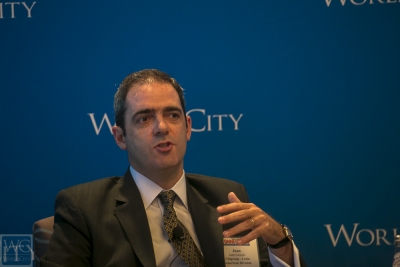
Juan Iramain, managing director of corporate communications and public affairs for Citi Latin America.
Yet business can’t revel too much in how much trust it now enjoys. Governments lost trust, partly because they did not deliver on expectations for jobs, roads and other basics. But business can’t fully deliver long-term, unless government provides more of those basics, said Frank Mora, director of the Latin America and Caribbean Center at Florida International University.
“I wonder whether the growing gap [in public trust] between business and government will at some point affect business,” said Mora, a former official with the U.S. Defense Department.
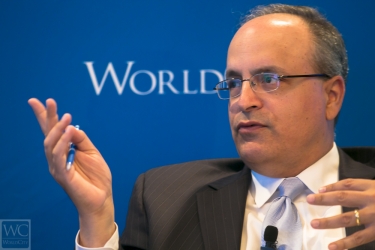
Frank Mora, director of the Latin America and Caribbean Center at Florida International University.
Indeed, even when the public has little trust in government today, it still expects governments to regulate business – especially in areas such as food and product safety, the survey showed.
“We don’t trust the man, but the man still has the responsibility to look out for the consumer,” said VanderMolen, cautioning companies not to take public trust as a given.
Building trust through corporate communications
How companies and organizations communicate to nurture trust differs widely.
For Medtronic, a maker of pacemakers and other medical devices, communication comes mainly between the company and the doctors who install the devices, said Jim Hogan, president of Medtronic Latin America. Many in the public have never head of Medtronic, whose sales top $16 billion per year.
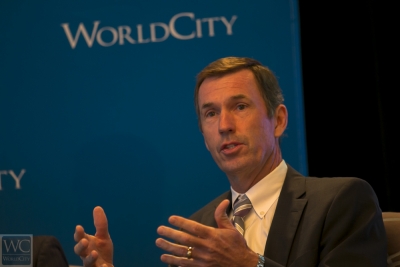
Jim Hogan, president of Medtronic Latin America
But for universities like FIU, communications instead centers on students mainly 18-24 years old. That means mastering social media, said Mora.
In financial services, a highly regulated field, companies have tended to be conservative and sought control over communications. But that model clearly is losing effectiveness, said Citi’s Iramain.
“We have to be aware of the trend away from “authority” toward [the public showing] more trust in themselves,” said the bank executive, who holds a doctorate in social communication.
Trust by country and by industry
Geography and industry matter for trust too, the study found.
Asked whose products and services they trust the most, the “informed public” in Latin America found Japan, Germany and Switzerland tops, with ratings near 90 percent. Brazil ranked best in Latin America, but still trailed far behind the world leaders, rating at 69 percent.
Technology far outpaced other industries for trust (88 percent), followed by autos (84 percent), the study showed.
But trust in technology, lifted by consumer gains from new devices, may soon slip. The public is increasingly concerned over government surveillance and hacking of databases, said VanderMolen.
“Data privacy and security is a big risk,” the Edelman executive told the group.
Audience members dug deeper with questions.
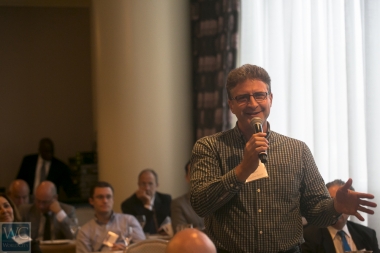
Evan Oster, vice president of De La Riva Group
How did Latin Americans’ perceptions differ from other world regions?, asked Evan Oster, vice president of De La Riva Group, which specializes in market research for Hispanic and Latin American markets. Latin Americans often “distrust” institutions, but don’t always say so on surveys, said Oster.
Latin Americans generally are less trusting, agreed VanderMolen. But economics and policy matter for trust too, not just regions. The survey found trust especially high in nations where there is strong economic growth and where wealth is shared, as in Singapore and the United Arab Emirates, he said.
Crisis management: Forget low-profile
How is trust affected after a crisis, as in the case of the missing Malaysian Airlines jet?, asked Francia Baez Guzman, a veteran in human resources long with Visa and now starting her own consulting firm.
The rule of thumb for crisis management is to find out: What happened? How did it happen? And what are you doing to make sure it doesn’t happen again? And organizations should strive for “maximum disclosure, minimum delay,” said VanderMolen.
Often, industries with a “low-profile” realize in a crisis that they don’t have the network of “influencers” they need to explain their business and its challenges to the public, added Citi’s Iramain.
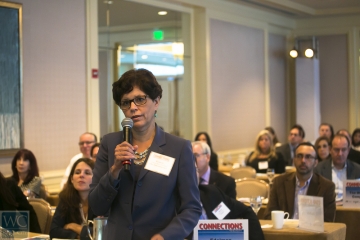
Francia Baez Guzman, a veteran in human resources long with Visa and now starting her own consulting firm.
They tend to work to build that network after the crisis, developing relationships with media, governments and others, “and they leave that low-profile religion,” said Iramain.
As communications shifts from “top-down” to “horizontal,” how does that affect marketing for businesses?, asked Lewis Greenberg, director of marketing for Daszkal Bolton accounting and advisory services firm.
Companies increasingly want a “joined-up narrative,” linking their corporate and product pitches. The challenge, said VanderMolen, is “to figure out the right story-telling platforms.”
Global Connections is one of six event series organized by media company WorldCity to bring together executives in the greater Miami area on international business topics. The Global series is sponsored by FIU College of Business, Waterford at Blue Lagoon, heating and cooling equipment maker Daikin McQuay and Edelman.
The next Global Connections is set for April 25 on “Media Americas: What’s Now and What’s Next.”